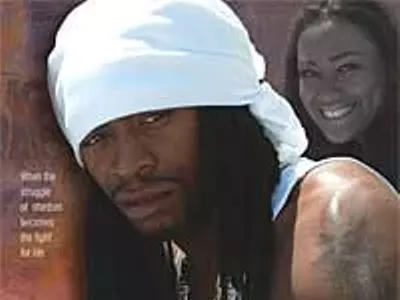I was fortunate enough to be born into a house of discriminating musical tastes. Thus, when I was a kid and my peers were cranking Dr. Dre and Guns N’ Roses, I was rummaging through my dad’s collection of Muddy Waters. Something about the raw, driving, irresistible pull of this music drew me in: I was hooked on the Hook, baited by the Wolf — and it wasn’t until I stopped and looked around at my classmates that I realized a love affair with the blues was highly unusual for a blond-haired, blue-eyed teenager from the suburbs.
And that’s about the time I discovered Johnny Winter on Muddy Waters’ seminal slice of brilliance, Hard Again. I listened to that record until I wore out the grooves, and then one day I uncovered a photo of the band and reached the shocking revelation: Holy shit, that dude is white!
And then some. Winter, true to his name, has the coloring of a fresh snowfall; legally blind and albino, Winter was naturally a shy, withdrawn child as he grew up in Texas. And like so many shy geniuses before and after him, he picked up a guitar, and used the instrument as his voice. His brother Edgar was born with the same affliction, and also turned to music as a muse – the two would cross a significant path later in life.
Throughout the ’60s, Winter played the popular rock ’n’ roll and R&B of the time, but his true love remained the blues. He bopped around Chicago, Texas and England, and by 1968, major labels were clamoring to sign him. Winter helped popularize the blues genre with white audiences as he incorporated rock elements into his searing blues riffs, creating a catchy crossover that was later emulated by fellow white-boy blues brothers Stevie Ray and Jimmy Vaughan.
Winter’s first gold record arrived in 1971, but he was soon forced to take a break while recovering from a spiraling heroin addition. During his hiatus, his brother Edgar formed a rock group, White Trash, with the rest of Johnny’s band and experienced a rocket flash to fame on the Billboard charts. Although Edgar quickly surpassed Johnny in mainstream popularity, the brothers continued an amiable relationship and collaborated frequently on musical projects.
But then came Johnny’s time in the spotlight; after his hiatus he returned with a vengeance with his work with Muddy Waters in 1977 on Hard Again, which won a Grammy for the single “Blue Sky.” More Grammy-winning collaborations with Waters followed: I’m Ready and Muddy, Mississippi Waters Live — many consider these three albums the pinnacle of Waters’ career.
Success continued to follow Winter throughout the ’80s and ’90s, tirelessly recording and touring, as he cemented his status in the “greats” category of blues. In 1986 he became the first white musician to be inducted in the Blues Foundation’s Hall of Fame.
Given the average blues musician’s life expectancy, combined with Winter’s failing health, it’s a startling tribute to his tenacity that the guitar slinger is 1) still alive and 2) able-bodied enough to endure the drudgery of a touring.
Winter’s childhood shyness is still evident; in a phone interview from his home in Connecticut, the 60-year-old musician is polite and friendly, but soft-spoken and terse.
Winter’s current tour is in promotion of his latest release, I’m a Bluesman, which he succinctly describes as “a good blues album.” It’s his first new work in almost eight years, the delay caused in part by a lengthy recovery from hip surgery.
“I was pretty messed up there for a while,” says Winter of his surgery. “It’s been four years now — I still have trouble walking around though.”
Like B.B. King, Winter now plays all of his shows while sitting in a chair. He concedes that the transition was hard at first, but “now it’s pretty normal.”
And what was Muddy Waters like?
“He was a sweetheart,” says Winter, “but he was the boss. He knew what he wanted to do and he got it done.”
Winter has always been slender, but these days his delicate frame has shrunken dramatically. Though his fingers remain nimble and his mind agile, his body is clearly struggling to keep up. A sonic powerhouse with his guitar in his lap, Winter remains a curious sight, his stick-thin white arms peppered with bunches of tattoos. Winter didn’t get his first tattoo until he was 40 years old. He now has 28.
“I just didn’t want any before that,” he explains. “When I was 40 I wanted to do something that was not destructive, but something different, so I got tattooed.”
He has one musical-related tattoo, a guitar plug.
Winter doesn’t speak much of the good ol’ days in the ’70s, be it reticence to discuss the past, or simply his shyness taking over. His sole comment: “It was a great time.”
By the height of his fame, Winter was warmly embraced by blues musicians as one of their own; but what was it like in the early years, before the fame? Did his unique appearance and his standing as a white man playing music in a predominantly black genre ever serve as a roadblock?
“Nobody gave me a hard time, at all,” he says. “I guess I was good enough to where they just accepted me.”
See Johnny Winter at the Magic Bag (22920 Woodward Ave., Ferndale) featuring Detroit native James Montgomery. Call 248-544-3030 for more information.
Sarah Klein is a Metro Times staff writer. E-mail [email protected]





